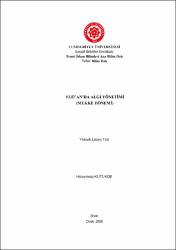| dc.contributor.advisor | Keskin, Hasan | |
| dc.contributor.author | Kütükde, Hüseyinalp | |
| dc.date.accessioned | 2022-04-28T09:22:22Z | |
| dc.date.available | 2022-04-28T09:22:22Z | |
| dc.date.issued | 2018 | tr |
| dc.date.submitted | 2018-01-05 | |
| dc.identifier.other | XI, 137 sayfa | |
| dc.identifier.uri | https://hdl.handle.net/20.500.12418/12589 | |
| dc.description.abstract | Kur’an’da çokça kullanılan “bilgi (ilm), zan, iman ve küfür” gibi önemli bazı kavramların odak noktasında algı kavramının olduğunu söyleyebiliriz. Soyut ve kapsamlı bir algılamayı ifade etmek için “külli algı” kavramını kullanmayı uygun bulmaktayız. Kur’an’da üstünlük, kutsiyet, zaman ve sosyal aidiyet algılarının üzerinde yoğun bir şekilde durulduğunu iddia edebiliriz.
Bununla birlikte Kur’an’ı incelediğimizde, günahları ve sevapları küçümsemeye ve dinî açıdan önemli olan bazı konuların önem sırasında kargaşaya neden olan algı bozukluklarına yöneltilen tenkitleri okumaktayız. Kur’an’ın bu algı bozukluklarını nasıl yönetip düzettiğini görmek için önce cahiliye insanının algı dünyasını tanımamız gerekir. Ayrıca inzal olmaya başladığından itibaren Mekke döneminde Kur’an ayetlerinin üzerinde durduğu hususları ve yöntemleri tespit etmemiz gerekir. Sonuç olarak bilgi çağında değil, algı çağında olduğumuzu iddia edebiliriz. Bunun bir sonucu olarak Kur’an’ın doğru algıları yerleştirmek, yanlış algıları yönetmek gibi bir amacı olduğunu düşünmekteyiz. | tr |
| dc.description.abstract | We may say that, concept of perception is located in the focal point of significant concepts that widely used in the Qur’an such as “wisdom, supposition, faith and denial”. We approve to use concept of “total perception” in order to express an intangible and extensive perception. We may claim that perceptions of superiority, holiness, time and social belonging have been emphasized intensely in Quran.
At the same time, when we analyse the Quran, we can realize directed criticisms about perceptual disorders that cause confusion on the order of importance of some important topics in religion and cause to underestimate sins and good deeds. In order to understand how Qur’an manages and corrects this perceptual disorders, firstly we should identify the perceptual perspective of jahiliyyah (cahiliye) people. Besides, we should determine the methods and emphasized questions by Qur’an verses in Mecca period, since its very beginning for revelation. Consequently, we can claim that it is the era of perception that we live in; not the information age. Thereupon, we declare that Qur’an has a purpose to place correct perceptions and to manage incorrect perceptions. | tr |
| dc.language.iso | tur | tr |
| dc.publisher | Sivas Cumhuriyet Üniversitesi - Sosyal Bilimler Enstitüsü | tr |
| dc.rights | info:eu-repo/semantics/openAccess | tr |
| dc.subject | Algı | tr |
| dc.subject | Algı Yönetimi | tr |
| dc.subject | Külli Algı | tr |
| dc.subject | Soyut Algı | tr |
| dc.subject | Kur’an’da Algı | tr |
| dc.title | Kur'an'da Algı Yönetimi ( Mekke Dönemi) | tr |
| dc.type | masterThesis | tr |
| dc.contributor.department | Sosyal Bilimler Enstitüsü | tr |
| dc.relation.publicationcategory | Tez | tr |















